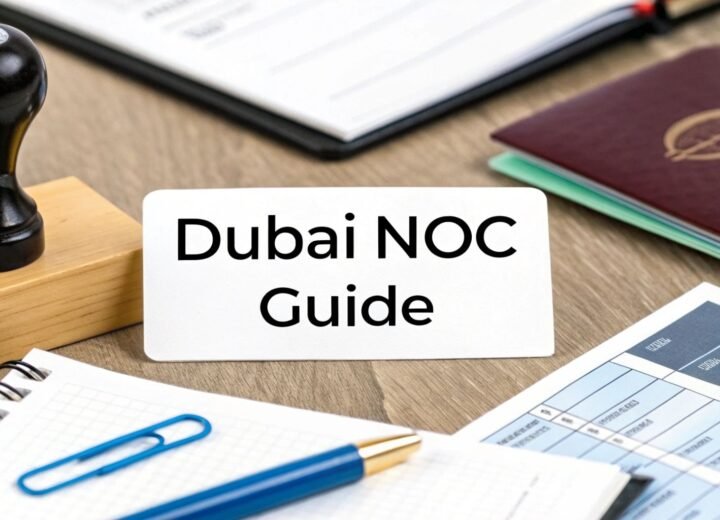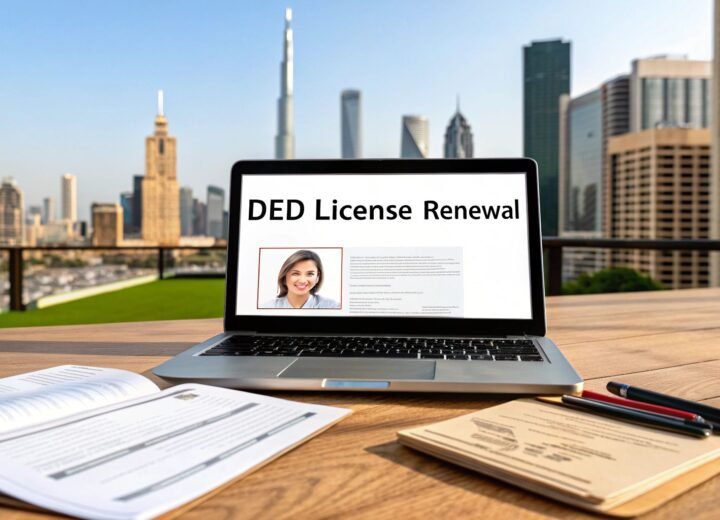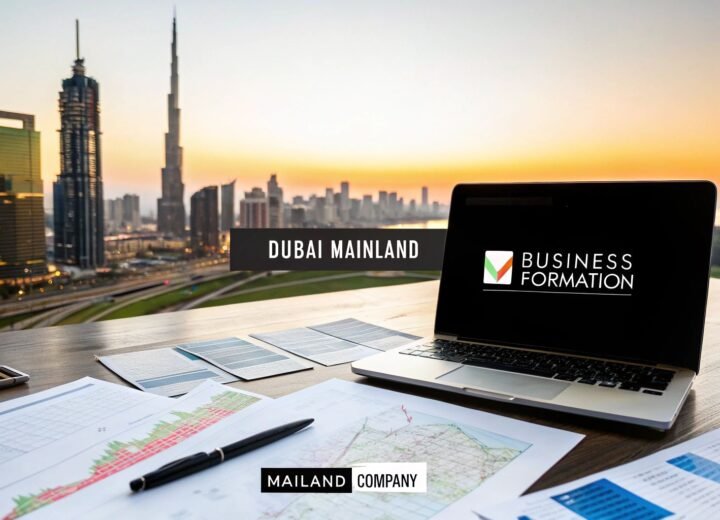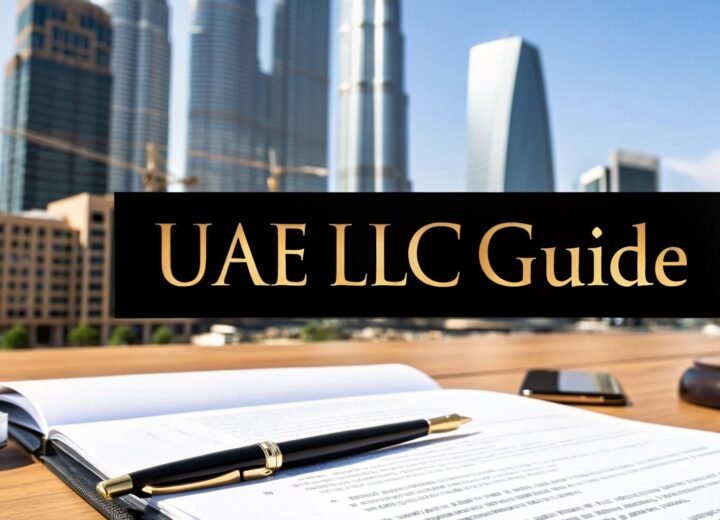Deciding to set up your business on the UAE mainland means you’re aiming for the heart of the action. It gives you the freedom to trade directly across all seven emirates, bid on lucrative government contracts, and set up a physical shop anywhere in the country. This is the strategic choice for businesses looking for deep market penetration and long-term growth within the UAE's vibrant local economy.
Why Choose a UAE Mainland Business Setup

Choosing where to plant your flag in the United Arab Emirates is one of the most critical decisions an entrepreneur can make. While free zones have their perks for certain business models, a business setup in UAE mainland offers a powerful set of advantages if you're targeting real, long-term growth inside the domestic market. It’s a move that places your company right in the centre of the nation's economy.
The main draw of a mainland company is its completely unrestricted operational scope. Unlike its free zone counterparts, a mainland business isn't stuck in one geographical area or limited to trading only with international clients. This gives you the liberty to work with any customer, business, or government body across the entire UAE, from Abu Dhabi to Fujairah.
Unrestricted Market Access
The biggest benefit of a mainland licence is the total freedom it offers. You can open offices, showrooms, or retail outlets in any location that makes sense for your business, putting you directly in front of your target audience. This is non-negotiable for sectors like retail, professional services, construction, and logistics, where direct access to the local market is the key to success.
Think about a consultancy firm specialising in corporate training. With a mainland licence, they could establish a head office in Dubai's Business Bay, open a smaller office in Abu Dhabi to serve government clients, and run workshops anywhere in Sharjah. This kind of geographical flexibility just isn't possible for a free zone company without going through some complex and often costly structuring.
The ability to directly access the entire UAE domestic market is the single most significant advantage of a mainland setup. It removes operational barriers and unlocks the full commercial potential of the country's diverse and affluent consumer base.
Eligibility for Government Tenders
Another massive pull for mainland companies is being able to bid on valuable government contracts. Federal and local government bodies are some of the biggest clients in the UAE, consistently spending billions on infrastructure, technology, and public services. Only companies holding a mainland licence are allowed to compete for these highly profitable tenders.
This opens up a crucial revenue stream that is completely off-limits to free zone entities. For businesses in fields like IT, engineering, construction, and specialised consulting, landing a government project can be a game-changer for growth and stability.
For entrepreneurs trying to decide which path is right for them, it's helpful to see the main differences side-by-side.
UAE Mainland vs Free Zone Quick Comparison
| Feature | Mainland Company | Free Zone Company |
|---|---|---|
| Market Access | Unrestricted access to the entire UAE domestic market. | Restricted to the specific free zone and international trade. |
| Office Location | Can rent or own office space anywhere in the UAE. | Must operate from within the designated free zone. |
| Government Tenders | Eligible to bid on all government contracts. | Ineligible to bid on government contracts. |
| Company Ownership | Up to 100% foreign ownership for most activities. | Typically 100% foreign ownership. |
| Visa Eligibility | Generally no limit on employee visas (depends on office size). | Visa eligibility is often tied to office/facility size. |
| Customs Duty | 5% customs duty on imported goods into the UAE. | 0% customs duty on imported goods (within the free zone). |
This table gives a quick snapshot, but the best choice really depends on your specific business goals and operational needs.
The Impact of 100% Foreign Ownership
The UAE's business landscape has changed dramatically over the last decade, with recent legal reforms acting as a major growth engine. Between 2023 and 2025 alone, official UAE government data shows that more than 350,000 new businesses were registered in Dubai, cementing its status as a top global entrepreneurial hub.
Much of this boom is thanks to landmark changes like Federal Decree-Law No. 26/2020. This law did away with the long-standing requirement for a local sponsor in most mainland sectors, now allowing up to 100% foreign ownership. You can find out more about the future of entrepreneurship and government reforms in Dubai.
This amendment has completely reshaped the investment climate, making a business setup in UAE mainland more appealing than ever for international entrepreneurs. It effectively combines the total operational freedom of a mainland licence with the full ownership control that used to be exclusive to free zones. This hybrid advantage truly offers the best of both worlds, empowering foreign investors to fully own and run their ventures while becoming a genuine part of the local economy.
Choosing Your Business Structure and Activities
Deciding on your company's legal structure and its licensed activities are two of the most critical calls you'll make when launching your business setup in UAE mainland. These aren't just administrative boxes to tick; they form the very foundation of your venture.
Getting this right from the start dictates everything—your operational scope, personal liability, ownership rules, and even your long-term growth potential. A mismatch here can lead to expensive restructuring down the line, so it’s vital to build on solid ground from day one.
Your legal structure defines how your business is owned and run, with real-world consequences for everything from asset protection to your ability to raise capital. For instance, knowing how to fund a startup is one thing, but your chosen legal form can heavily influence which financial strategies are actually available to you.
Selecting the Right Mainland Legal Form
The UAE mainland offers a menu of legal structures, but for most entrepreneurs, two options consistently rise to the top for their flexibility and practicality. The secret is to align the structure with your specific business model and where you see yourself in five or ten years.
A Limited Liability Company (LLC) is, by far, the most common and versatile choice. It establishes a separate legal entity, which means your personal assets are shielded from any business debts or liabilities. This structure is a perfect fit for a massive range of commercial and industrial activities, whether you're opening a retail shop in Dubai Mall or building a global software platform. An LLC can have up to 50 shareholders and, thanks to recent reforms, now offers 100% foreign ownership for the majority of business activities.
Choosing a Limited Liability Company (LLC) is often the most strategic move for entrepreneurs aiming for maximum operational flexibility and personal asset protection on the UAE mainland. Its structure supports diverse business models, from trading to technology.
A Sole Establishment, on the other hand, is owned and operated by a single individual. This is the go-to structure for professionals offering specialised services—think consultants, doctors, or freelance designers. It’s simpler to set up, but it doesn't create a separate legal entity, meaning the owner is personally liable for the business's debts. For individual practitioners, its simplicity is often its biggest selling point.
A Tale of Two Businesses
Let’s put this into a real-world context with two different entrepreneurs.
-
Scenario 1: The Tech Startup
An international team is launching a new software-as-a-service (SaaS) platform. Their roadmap includes seeking venture capital and scaling their team quickly. The LLC is the only logical choice here. It protects the founders’ personal assets, accommodates multiple shareholders (including future investors), and provides the credible corporate structure that VCs demand. -
Scenario 2: The Marketing Consultant
A freelance marketing expert wants to formalise her business. She's the sole provider, has no immediate plans for partners or investors, and wants to keep things straightforward. A Sole Establishment with a professional licence is a perfect match. It's cost-effective, easy to manage, and directly linked to her professional expertise.
If the LLC route sounds like the right path for you, it’s worth digging into the details. You can explore its full range of benefits in our guide on the Limited Liability Company in the UAE.
Defining Your Business Activities
With your legal structure sorted, the next step is to pinpoint your business activities from the official list provided by the Department of Economic Development (DED). This isn't just paperwork; it legally defines what your company is allowed to do. Every activity has a unique code, and your final trade licence will list all of your approved operations.
Choosing the correct codes is crucial. For example, opting for a "General Trading" licence gives you the freedom to trade in a wide variety of goods, but it also comes with a higher price tag. In contrast, selecting a highly specific activity like "Boutique Management Services" will narrow your scope but might be more budget-friendly.
The smart move is to align your chosen activities with not only your current business plan but also your future ambitions. This foresight can save you the time and expense of amending your licence later on. This is where professional guidance becomes indispensable. As specialists in Mainland Company Formation in Dubai, Sharjah & Abu Dhabi, we help entrepreneurs navigate this complex list to ensure their licence is a perfect reflection of their commercial goals.
Navigating The Licensing And Registration Process
Once you've settled on your business structure and activities, the focus shifts from planning to a series of concrete, administrative steps. This is the point where your business setup in UAE mainland starts to feel real. The process is straightforward and sequential, ensuring your new company is fully compliant with all the right authorities from the very beginning.
The first thing on the list is to reserve your trade name. This name is your business's unique identity and has to follow the UAE’s naming rules. It can't be offensive, must not already be taken, and needs to include the correct legal acronym, like LLC. Getting this right from the start avoids frustrating delays and sets a professional tone for your venture.
After securing your name, the next big milestone is getting Initial Approval from the Department of Economic Development (DED). Think of this as a crucial "no objection" certificate that signals the UAE government is on board with your proposed business. While it’s not the final licence, it’s the green light you need to move forward with things like drafting your legal documents.
Crafting Your Foundational Documents
With the Initial Approval sorted, it's time to formalise how your company will be run. This is done through a Memorandum of Association (MOA), a legal document spelling out the rules and responsibilities of all shareholders. For any Limited Liability Company, this document is a must-have and needs to be carefully drafted and then notarised by a UAE public notary.
Essentially, the MOA is your company’s constitution. It lays out critical details like:
- The names of all partners and how many shares each holds.
- The company's primary objectives and business activities.
- The agreed-upon method for distributing profits and losses.
- The management structure and how decisions will be made.
Precision here is everything. Any vague language in the MOA can cause serious disputes down the line, so it’s worth investing the time to get every detail perfect.
The infographic below shows how the early decisions you make about your company's structure, activity, and funding all lead up to this registration stage.
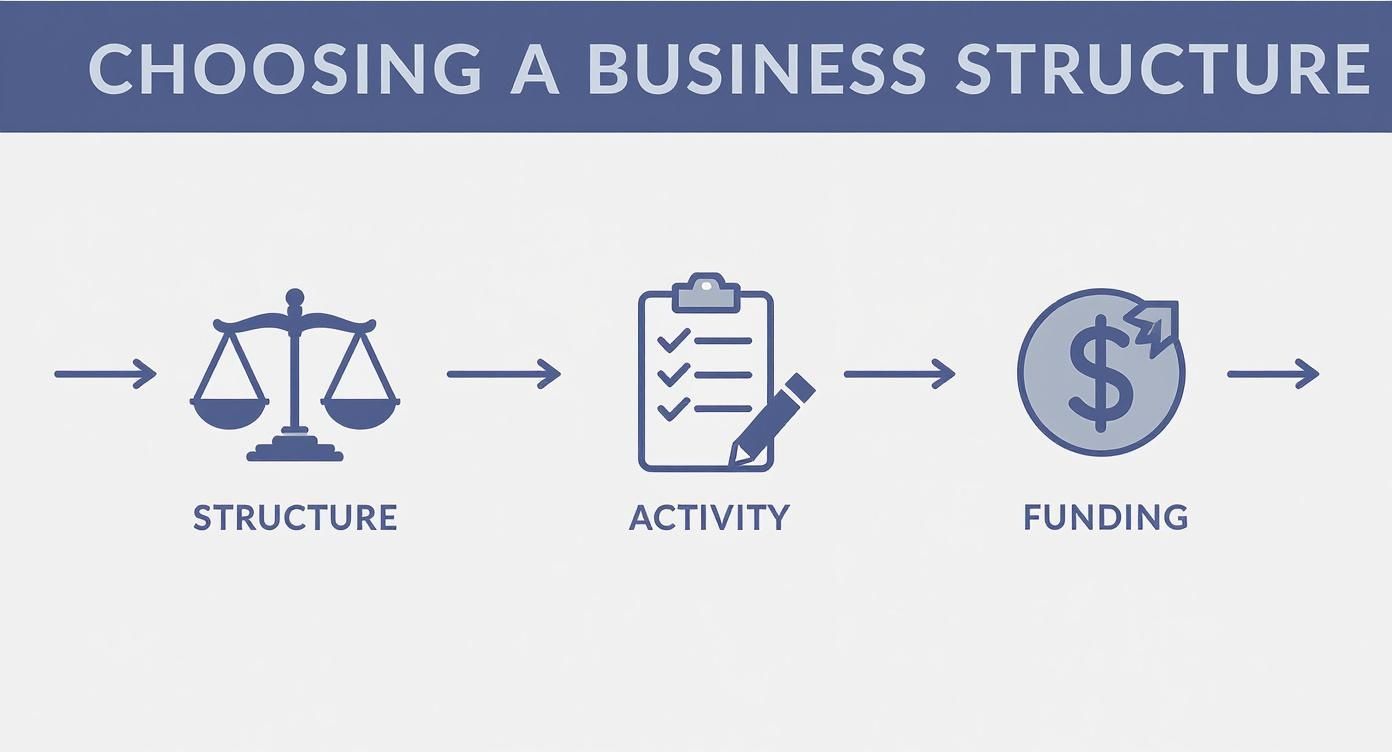
As you can see, those initial choices directly shape the legal and financial framework you'll be formalising during the licensing process.
To give you a clearer overview, the process can be broken down into several key stages, each with its own objective and documentation requirements.
| Key Stages of Mainland Business Setup |
| :— | :— | :— |
| Stage | Primary Objective | Key Documents / Requirements |
| 1. Trade Name & Initial Approval | To reserve a unique business name and get preliminary government consent. | Proposed trade names, passport copies of shareholders, business activity details. |
| 2. Legal Documentation (MOA) | To define the company's legal structure, shareholder duties, and operational rules. | Drafted Memorandum of Association, shareholder passports, Initial Approval certificate. |
| 3. Office Lease Registration | To secure a physical business address, a mandatory legal requirement. | Signed tenancy contract, Ejari certificate (for Dubai). |
| 4. Final Licence Submission | To submit all compiled documents for the final issuance of the trade licence. | Notarised MOA, Ejari, passport copies, application forms, any external approvals. |
| 5. Post-Licence Registration | To register with labour and immigration authorities to legally hire staff and process visas. | Trade licence, Establishment Card application, partner visas. |
This table acts as a quick checklist, helping you track your progress and ensure you have all the necessary paperwork ready for each step.
Securing A Physical Address And Final Approvals
Every single mainland company in the UAE is required to have a registered physical office. This isn't just a box-ticking exercise; it's a legal necessity. You’ll need to provide a valid tenancy contract and an Ejari certificate—the official online lease registration system in Dubai—to prove you have a legitimate place of business.
A registered office lease is non-negotiable for mainland company formation. This step validates your physical presence in the UAE and is a prerequisite for the final issuance of your trade licence.
Once your MOA is notarised and your office lease is in hand, you're ready to submit everything for the final trade license in Dubai. Depending on your business, you might also need extra approvals from specific government ministries.
For instance, a new healthcare clinic will need a green light from the Dubai Health Authority (DHA), while a construction firm needs permits from the local municipality. This is where professional help really pays off. As specialists in Corporate PRO Services and Attestation Services, we handle these complex government interactions, making sure all the necessary permissions are secured without a hitch. Our team acts as your direct line to government departments, managing submissions and follow-ups to keep things moving.
Finally, after all documents are submitted and the fees are paid, the DED will issue your official trade licence. This is the ultimate proof that your company is legally registered and ready to operate in the UAE. From there, you'll need to register with the Ministry of Human Resources and Emiratisation (MOHRE) to hire staff and with the General Pension and Social Security Authority if you have Emirati employees.
Securing Visas and Managing Post-Setup Compliance
Getting your trade licence is a huge milestone when you’re setting up a **business in the UAE mainland**, but it’s really just the beginning. Think of it as the key that unlocks the next, equally important phase: sorting out your residency and making sure your business is built to last.
This is the point where you shift from simply having a registered company on paper to creating a fully operational business that can hire people and manage its money legally.
The very first thing on your to-do list after the licence is in hand is applying for your company’s Establishment Card. This little card is a big deal. It’s issued by the immigration authorities and officially gets your company into their system. Without it, you can't even start the visa application process for yourself or any future employees.
Navigating the Visa Application Journey
With the Establishment Card secured, you can dive into the visa process. It's a well-trodden path for both investors and employees, but every step needs to be handled with care to sidestep any frustrating delays.
It all kicks off with an application for an entry permit. This document allows you to enter the UAE specifically for work or investment purposes. Once you’re in the country, the clock starts ticking to get the rest done.
- Medical Fitness Test: Every new resident has to go through a medical check-up at a government-approved health centre. It’s a standard screening for certain communicable diseases.
- Emirates ID Application: Next up, you’ll head to an Emirates ID service centre to have your biometrics taken—that’s your fingerprints and a photo. The Emirates ID is the mandatory identification card for absolutely everyone living here.
- Visa Stamping: After your medical results come back clear and your biometrics are logged, the final piece of the puzzle is getting the residence visa stamped directly into your passport. This stamp is your official green light to live and work in the UAE.
This journey is a core part of establishing your presence. As specialists in Golden Visa on Property and Investor Visa, we've seen it all and can guide you through the specific details of each application, making sure your path to residency is as smooth as possible.
Post-Setup Essentials for Long-Term Success
Beyond getting your visa sorted, there are a few other critical tasks that will set your business up for compliance and growth. It's easy to overlook these post-incorporation steps in the excitement, but they are the foundation of your company's stability.
Opening a corporate bank account should be your top priority. You absolutely need a business bank account to handle your finances, accept payments from clients, and keep your bookkeeping clean. Banks in the UAE have very strict compliance and "Know Your Customer" (KYC) rules, so be ready to present a full set of your company documents and be prepared to explain your business model in detail.
A common pitfall for new entrepreneurs is underestimating the time and documentation required for opening a corporate bank account. Start this process immediately after receiving your trade licence to avoid cash flow disruptions.
Understanding your tax obligations is also non-negotiable. With the introduction of a federal Corporate Tax in the UAE, businesses must register with the Federal Tax Authority (FTA). It's your responsibility to maintain accurate accounting records and file your tax returns on time. For a deeper understanding of the visa requirements for your new venture, explore our detailed guide on the business visa process in Dubai.
Maintaining Ongoing Compliance
Finally, remember that a business setup in UAE mainland isn't a one-and-done deal. It requires consistent attention to stay in good legal standing with the authorities. This primarily involves the annual renewal of your trade licence and any other permits specific to your business activities.
You also have to comply with newer regulations like the Ultimate Beneficial Owner (UBO) registration. This means you must keep an updated register of the individuals who ultimately own or control your company and submit this information as required. Staying on top of these administrative duties is what keeps your business running without any hiccups, freeing you up to focus on what really matters—growing your company.
Tapping Into UAE Economic Growth and Future Opportunities
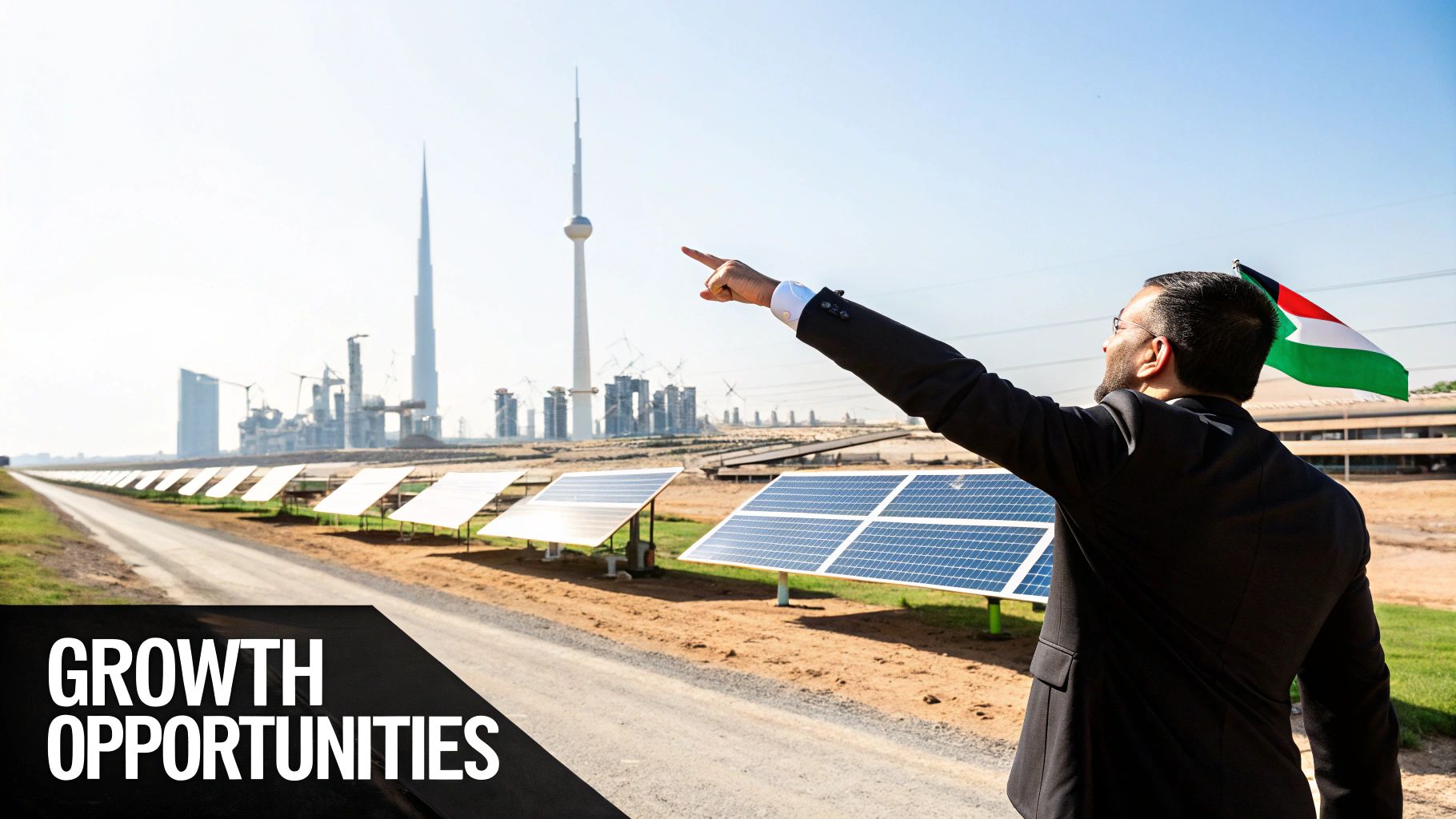
Finalising your business setup in UAE mainland isn't just about ticking a legal box. Think of it as gaining a front-row seat to one of the most dynamic and ambitious economies on the planet.
By setting up here, you're plugging directly into the nation's vision for a future built on diversification, smart technology, and sustainable growth. It’s a pretty exciting place to be.
The UAE government is pouring serious investment into its non-oil sectors, which has created incredibly fertile ground for businesses that can contribute to these long-term goals. For mainland companies, this is a golden ticket—your direct access to the local market makes you a perfect fit for this country-wide transformation.
Aligning with Booming Economic Sectors
The country's economic roadmap is crystal clear: technology, renewable energy, and next-generation logistics are the future. This is where mainland businesses have a distinct edge, as they can seamlessly integrate into local supply chains and get involved in major national projects.
Picture this: a tech consultancy with a mainland licence is perfectly positioned to bid on government contracts for Dubai's smart city initiatives. Over in Abu Dhabi, a sustainable engineering firm can partner directly with local players on massive solar power projects. This kind of direct participation is a huge perk of operating on the mainland.
-
Technology and Digital Transformation: The UAE’s digital economy is on a steep upward curve, thanks to huge pushes in AI, fintech, and e-commerce. A mainland setup lets tech firms work with both government bodies and private companies that are hungry for new digital tools.
-
Sustainable Energy Initiatives: With its sights set on Net Zero by 2050, the UAE is investing heavily in green energy. This has opened up a massive market for mainland companies working in renewables, energy efficiency, and eco-friendly construction.
-
Global Trade and Logistics: Sitting right at the crossroads of global trade, the UAE is constantly upgrading its world-class ports and logistics infrastructure. Mainland trading companies are free to take full advantage, importing and distributing goods across the entire country without any restrictions.
The Strategic Value of a Mainland Presence
The real power of a mainland company is its agility. When the government announces a new initiative or kicks off a major project, you can pivot and respond almost instantly. Being this close to the nation's economic pulse gives you a competitive advantage that’s hard to overstate.
Economic forecasts for 2025 see the UAE hitting a GDP growth rate of around 5.1%, with tech, trade, and green energy leading the way. This growth is directly accessible to mainland businesses, which can trade freely with the local market and compete for government tenders—opportunities that just aren't on the table for most free zone companies.
A mainland business isn't just operating in the UAE; it's an integral part of the UAE's economic fabric. This integration is essential for building long-term relationships and achieving sustainable growth.
As you start to build your team to grab these opportunities, getting your internal systems right from day one is key. New business owners should definitely look into comprehensive guides to small business hiring software as they plan their growth. It’s the kind of forward-thinking that ensures your operations can keep up with your ambitions. By embedding your company in the local economy, you’re not just building a business—you’re securing your place in the future of the UAE.
Your Top Questions About UAE Mainland Setup, Answered
When you're looking to start a business on the UAE mainland, a lot of questions pop up. It's completely normal. Getting clear, simple answers is the best way to move forward with confidence. We get these questions all the time, so we've put together the essential information you need right here.
Think of this as your go-to guide for clearing up any confusion about ownership, capital, how and where you can operate, and what costs to expect down the line.
Ownership and Sponsorship Clarifications
One of the biggest questions we hear is about needing a local partner. The great news is that the rules have changed, making the mainland a much more attractive option for international entrepreneurs.
Do I still need a local UAE sponsor for a mainland company?
For most businesses, no. That requirement is largely a thing of the past. Recent changes in the law now allow for 100% foreign ownership for the vast majority of commercial and industrial companies setting up on the mainland. This is a huge shift, giving you complete control over your business.
That said, a few strategic sectors, like banking and insurance, do have their own specific ownership rules. It's always a good idea to double-check the exact requirements for your specific business activity with the Department of Economic Development (DED). That's the final word.
Financial and Capital Requirements
Next up are the financial questions, especially around how much money you need to get started. Many entrepreneurs worry about share capital, but the UAE has made things much easier on this front.
What is the minimum capital requirement for a mainland LLC?
There isn't one. For most Limited Liability Companies (LLCs) on the UAE mainland, there is no mandatory minimum share capital you have to deposit. The law simply says your capital should be "sufficient" for what your company plans to do. You're not legally obligated to put a specific amount into a bank account just to get set up.
This change has made launching a mainland business much more affordable, particularly for startups and smaller companies. It's a key part of our cost-effective business setup solutions tailored to your needs.
The UAE’s decision to remove a mandated minimum share capital sends a strong message. It shows a real commitment to creating a flexible, supportive environment for new businesses and eases the upfront financial burden on entrepreneurs.
Operational Scope and Flexibility
Understanding what your licence allows you to do is critical. This is where a mainland setup really shines compared to other options in the UAE.
Can I operate my mainland business from anywhere in the UAE?
Yes, absolutely. This is one of the single biggest advantages of having a mainland licence. You have the freedom to trade and do business directly with the entire UAE market, with no geographical handcuffs.
This means you can:
- Set up your main office in Dubai, open a branch in Abu Dhabi, and run a shop in Sharjah.
- Bid on big government and private sector projects across all seven emirates.
- Work with customers and suppliers anywhere in the country without needing a middleman or local agent.
This kind of freedom gives you a level of flexibility that you just don't get with a free zone company, which is typically confined to its specific zone. You also enjoy UAE tax benefits for international entrepreneurs, making the mainland an even more attractive proposition.
Understanding Ongoing Costs and Compliance
Beyond the initial setup fees, you need to plan for the annual costs that keep your business running legally.
What are the ongoing annual costs after setting up my mainland company?
The yearly expenses are fairly predictable. The main ones are renewing your trade licence with the DED and your office lease agreement (Ejari).
On top of that, you'll have renewal fees for your Establishment Card and any visas for yourself and your staff. It’s also important to budget for annual accounting, potential audits, and staying compliant with Corporate Tax regulations. Getting these things right ensures your business operates without a hitch. Our 24/7 Support Service is always here when you need us to help you stay on top of these requirements.
Ready to make your business vision a reality in the UAE? It can feel like a complex journey, but you don't have to do it alone. As specialists in Mainland Company Formation in Dubai, Sharjah & Abu Dhabi and Freezone Company Formation across the UAE, our expert team is here to guide you every step of the way.
✅ Specialists in Golden Visa on Property and Investor Visa
✅ Specialists in Corporate PRO Services and Attestation Services
✅ 24/7 Support Service – Always here when you need us
✅ Cost-Effective Business Setup Solutions tailored to your needs
✅ Enjoy UAE Tax Benefits for International Entrepreneurs
📞 Call Us Now: +971-54-4710034
💬 WhatsApp Us Today for a Free Consultation

